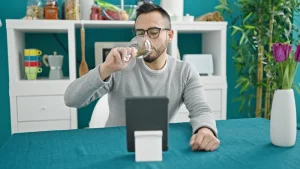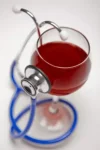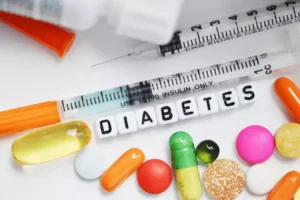Dehydration: Causes, Symptoms, Treatment, and More

Drinks like coffee, sodas with caffeine — and even alcohol — can have a diuretic effect, meaning they can cause you to urinate or pee more, which can then further dehydrate you. While it’s tempting to slurp down that does drinking cause dehydration iced mocha and think you’re properly hydrated, it’s not that easy. Overloading your system with water will only cause your body to eliminate any excess through your urine — taking vital electrolytes with it.
drinks ranked best to worst
Staying hydrated is as important to your health as eating, exercising, and sleeping well. It’s especially important at times when you’re more likely to lose fluids or when you need more fluid than usual, such as during an illness, pregnancy, or exercise. Treatments for dehydration include rehydrating methods, electrolyte replacement, and treating diarrhea or vomiting, if needed. If you have a fever, your body loses fluid through your skin’s surface in an attempt to lower your temperature. Often, fever can cause you to sweat so much that if you don’t drink to replenish, you could end up dehydrated.
A fresh look at risks for developing young-onset dementia
It could lead to neural tube defects in your developing baby and result in them being born with disabilities. If you’re seeing a healthcare provider, they’ll figure out what level you’re at to assign you treatment. Dehydration also can occur in any age group if you don’t drink enough water during hot weather — especially if you are exercising vigorously. Anyone may become dehydrated, but the condition is especially dangerous for young children and older adults. However, research is mixed on the hydrating effects of certain beverages. While all liquids can help maintain hydration status, some may be more beneficial than others.
Who is at risk from dehydration?
- People who are already at risk of dehydration should avoid or limit their alcohol consumption.
- By drinking more fluids, you can typically treat any bout of mild hydration.
- In fact, it’s possible to still feel thirsty and dehydrated, even if you’re someone who prides themselves on their water-drinking game.
- «When you are thirsty, you are already heading down the road to dehydration,» Schreiber says, which is why you need to be drinking water all day long — not just when you are thirsty.
- Herbal teas are caffeine-free and a great alternative to coffee and caffeinated tea, which have diuretic effects.
Exactly how much water you need depends on your weight, age, level of activity, the climate of your environment and other factors. People with diabetes, heart disease, cystic fibrosis and other conditions may need to be cautious. The amount of water you need can also depend on the climate and what clothes you’re wearing. Although the standard advice is eight glasses of water per day, talk to your healthcare provider to confirm the right amount for you. To avoid dehydration, active people — people playing a sport or exercising — should drink at least 16 to 20 ounces (oz.) of fluids one to two hours before an outdoor activity.

You may need intravenous (IV) fluids or other medical treatment. If your child appears dehydrated, it’s best to contact a provider right away. You lose water through sweat, urine, stool, vomit, and tears. When dehydrated, your body doesn’t have enough water to work well.

They may ask you to adjust them or to follow different advice altogether. When you are dehydrated, there is less blood travelling around the body. In response, the heart may start beating faster (tachycardia) to help move blood around the body. You may experience this as a racing, pounding heartbeat in your chest, called palpitations. Studies have also linked energy drinks to serious side effects, including anxiety, rapid and irregular heartbeat, kidney injury seizures, and death. Alcohol can also contribute to dehydration by affecting alertness and judgment and making you less aware of your body temperature.


